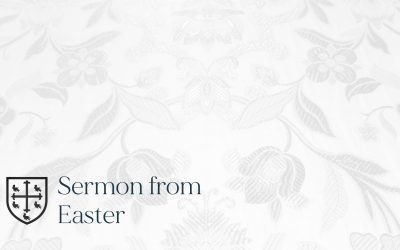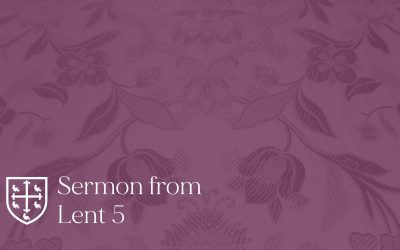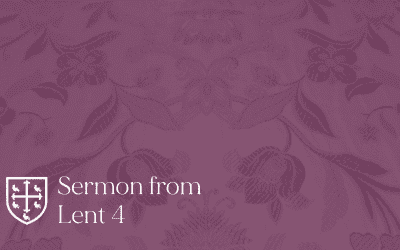1 Lent Year B 2/18/2024
Genesis 9:8-17; Psalm 25:1-9; 1 Peter 3:18-22; Mark 1:9-15
Rev. Mark A. Lafler
James Hewett tells this early 19th century story.
In the early days of our country, a weary traveler came to the banks of the Mississippi River for the first time in his life.
There was no bridge.
It was early winter, and the surface of the mighty stream was covered with ice.
Could he dare cross over?
Would the uncertain ice be able to bear his weight?
Night was falling, and it was urgent that he reach the other side.
Finally, after much hesitation and with many fears, he began to creep cautiously across the surface of the ice on his hands and knees.
He thought that he might distribute his weight as much as possible and keep the ice from breaking beneath him.
About halfway over the river, he heard the sound of singing behind him.
Out of the dusk there came a man, driving a horse-drawn load of coal across the ice and singing merrily as he went his way.
Here he was, on his hands and knees, trembling lest the ice be not strong enough to bear him up!
And there, went a man, his horses, his sleigh, and his load of coal, upheld by the same ice on which he was creeping!
And like this weary traveler, some of us have learned only to creep upon the promises of God.
Cautiously, timidly, tremblingly we venture forth upon His promises,
as though the lightness of our step might make His promises more secure.
As though we could contribute even in the slightest to the strength of His assurances![1]
As, God’s people, as Christians professing Jesus as Savior and Lord…
He has promised to be with us. Let us believe that promise!
He has promised to uphold us. Let us believe Him when He says so.
He has promised to grant us victory over all our spiritual enemies.
Let us trust His truthfulness.
Above all, He has promised to grant us full and free forgiveness of all our sins because of Jesus Christ, our Savior.
And He has promised to come and take us to His eternal home.
Let us take Him at His word.[2]
We may tread lightly on these promises as though they were too fragile to hold us up.
Or we may stand upon them…
confident that God is as good as His word and that He will do what He has pledged.
God’s promises…
We see his nature concerning his truth, faithfulness and promises in our reading today from the book of Genesis.
God makes a Covenant with all people.
Not just Noah, or his family, but all people…
All people that are to come after the flood.
This includes you and me, and everyone in this world.
He even makes this covenant with all the animals of the earth.
He promises to never again destroy the earth with a flood.
Theologically speaking a covenant refers to the act of God…
in freely establishing a mutually binding relationship with humankind.
Through the covenant God bestows blessings on humans in conditional or unconditional terms.
Here in this covenant…
The covenant with its sign being the rainbow…
it is clearly in unconditional terms.
There is not any condition or work that is expected from humanity.
God just declares that he won’t destroy the earth with a flood.
And the fact that this covenant is extended to animals is certain proof that it is not dependent upon acceptance.
Animals are not capable of accepting a covenant.[3]
And the sign of this covenant is the rainbow…
Often God chooses something to be a sign of a covenant that he makes.
In our present text we have the rainbow…
In the Torah we have circumcision and sabbath being signs of the covenant made with Moses and the people of Israel.
In the New Testament we have the sign of the New Covenant with Baptism and Communion.
The rainbow is a sign of God’s Covenant of Grace.
The rainbow is a token…
A remembrance…
Of that sign of Grace.
Against the background of storm and rain…
Thunder and lightning…
The rainbow stands out in vivid color of the grace of God.
And that is what it means in our text here.
The rainbow shows up a few times in the scriptures…
In Ezekiel 1.28 it refers to the brightness of God.
It symbolized the glory of God.
The rainbow also shows up in the book of Revelation…
as light around the throne of God…
Both of these instances refer to God’s glory and are biblical reminders of the Covenant keeping God…
The one who bestows grace upon his people.
God’s dazzling bow –
his universal, unilateral, unconditional sign of his grace.[4]
He acts upon this sign.
His promises are true and sure.
It points to the new covenant…
A foreshadowing…
The covenant that was exercised with the cross and resurrection.
You see,
In Christ we find grace instead of wrath.
In Christ we find gift instead of destruction.
In Christ we find favor instead of punishment.
But why a rainbow?
The text isn’t there so that we can discover the first climate events regarding rain and storms.
God often takes natural things and blesses them…
Gives them even greater purposes…
You see this with water in baptism…
Or bread and wine in The Eucharist.
They are common things that become sacred…
Become sacramental…
Points of declaring his grace…
And distributing his grace.
In Hebrew the word bow may mean either the phenomenon in the sky or it may also mean a weapon.
It is the same in our English.
It may mean, the bow in the sky or the bow that shoots the arrow.
The Hebrew word can mean either one.
According to archeological findings, the bow and arrow have been found to reach back to prehistoric people…
Before the time of Noah…
It is used for violence, destruction, and it is a weapon of war.
And God has specifically chosen this word to describe the sign of this covenant in Genesis.
Yet here… God is reinterpreting the word bow.
The symbol of combat has become the sign of peace and well-being.
Not only have the destructive flood waters ceased…
The sign of peace has been declared.
Its placement in the clouds…
points to the ending of God’s hostilities against mankind.[5]
It brings to mind the words of the prophet Isaiah (2.4-5):
They will beat their swords into plowshares
and their spears into pruning hooks.
Nation will not take up sword against nation,
nor will they train for war anymore.
Come, descendants of Jacob,
let us walk in the light of the Lord.
This covenant points toward the God of peace who brings peace to all the earth.
And that peace is ultimately found in Jesus Christ.
Who became the way for people to receive the forgiveness of sins.
God’s promises are good.
We can count on them.
We can trust him.
We don’t need to crawl on them like that weary traveler on the river…
Hoping that the ice will remain firm.
I encourage you today, as we are just starting in our season of Lent…
To trust in the goodness of God.
To trust in his promises…
In his covenants.
In Lent we embark in the practice of self-sacrifice, self-discipline…
Self-examination and Confession…
Abstinence and fasting…
These practices can seem daunting…
Perhaps even miserable…
They can make us irritable.
Our intention is to draw closer to God…
To prepare for Holy Week…
To prepare for the Cross, and the Resurrection.
Nevertheless, in the midst of struggle and sacrifice we can become overwhelmed by the burden…
But in the midst of Lenten disciplines…
Or in the midst of the difficulties of life in general…
Or the specific things that cause us anxiety and pain…
May we not forget the goodness of God.
The goodness of His promises.
In Christ, we are his new creation. (2 Corinthians 5)
In Christ, we are saved. (Romans 10)
…by His grace we have been saved, through faith—and this is not from ourselves, it is the gift of God…
(Ephesians 2.8-9)
Let us walk in this.
I am thankful for our Psalm today…
As it also reminds us to trust in God.
Listen once again to the words:
In you, Lord my God,
I put my trust.
I trust in you;
do not let me be put to shame,
nor let my enemies triumph over me.
No one who hopes in you
will ever be put to shame,
but shame will come on those
who are treacherous without cause.
Show me your ways, Lord,
teach me your paths.
Guide me in your truth and teach me,
for you are God my Savior,
and my hope is in you all day long.
Remember, Lord, your great mercy and love,
for they are from of old.
Do not remember the sins of my youth
and my rebellious ways;
according to your love remember me,
for you, Lord, are good.
Today let us be reminded of the goodness of God.
His ways are trustworthy and true.
And his faithfulness reaches to the skies (Psalm 36.5)
May we believe it.
May we live it.
May we walk it out.
And may we share that grace…
That good, good, grace that comes with the presence of God…
May we share it with the people around us.
Amen.
[1] From James S. Hewett
[2] Hewett
[3] Victor P. Hamilton, The Book of Genesis: Chapters 1-17, TNICOT (Grand Rapids: Eerdmans, 1990), 316.
[4] R. Kent Hughes, Genesis: Beginning and Blessing, Preaching the Word (Wheaton: Crossway Books, 2004), 148.
[5] Hamilton, 317.




